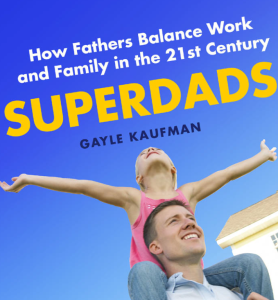With dramatic changes in work and family life over the past few decades, including increases in women’s labour force participation, especially with mothers, Singaporean families consisting of a breadwinner husband/father and homemaker wife/mother are decreasing in numbers.
However, dual-earner families with working parents often struggle to balance the time commitments involved in performing work and family roles.
As Gayle shares in her book: “Today’s dads want to spend more time with their children and yet struggle with how they will spend that time with their kids while still being responsible workers. They may think and plan before their child arrives.
“Or it may not occur to them until they are holding their newborn. But, more often than not, fathers come to the realisation that they want to be more than financial providers — they want to be dads.”
However, her book also notes that while expectations for father involvement have risen, the societal support to make greater involvement possible have not kept pace. The workplace still sees men as men and not as fathers.
We got permission from Gayle — a professor of sociology and gender & sexuality studies at Davidson College — and her publisher, to excerpt some of the interesting findings and tips that might interest our Singapore working dads below.
The following is taken from Superdads, Gayle Kaufman

What are fathers like these days?
Most fathers today can be classified as what we have come to call “new” or “involved” dads. These fathers want to spend more time with their children, and they often make some effort to tweak their work schedules in order to be there for important events.
Many set aside family time to avoid work interference, though this may mean doing work tasks after their kids are in bed. When they are at home with their families, they pride themselves on being highly involved and sometimes equal parents.
These new dads have largely replaced the more traditional fathers of the past, what I refer to as “old” dads. While old dads are much fewer in number, they are likely to persist as a category, as some men continue to view their primary role as breadwinners and others simply define themselves as workaholics.
However, though these fathers do not spend an enormous amount of time with their children, they also do not generally fall into the “read the paper and drink a cocktail” stereotype of the past. The little time with their children is seen as quality time.
Therefore, even this group of fathers is qualitatively different from the providers of the past. Finally, a third group has developed out of the evolving roles of fathers, and these are what I call “superdads.”
At a most basic level, new dads can be seen as the male equivalent of the supermom. New dads are indeed trying to “have it all” by combining work and family.
And like supermoms before them, they are experiencing a great deal of stress as they attempt to balance these two realms.
This is because new dads add the active dad role without getting rid of their work role, much as supermoms added the work role without getting rid of their mom role.
Superdads are highly involved, like the new dads, but what distinguishes them is that they specifically make changes to their work lives to accommodate their family lives.
In this sense, they are like working mothers, who are often the ones to sacrifice career advancement for their families.
Why does it matter for dads to be engaged with their children?
Fathers who are more engaged with their children have higher levels of psychological well-being.
Fathers say that they learn more about themselves, their values, and their ability to express emotions from children. In learning how to care for their children, fathers develop important skills and gain more self-assurance.
Children also benefit from contact with fathers. Children who live with their father generally have better outcomes in terms of grades and delinquent behaviour.
However, all residential fathers are not equal. When adolescents live with their father and have a close relationship with him, they have higher self-esteem and less depression, indicating the importance of father relationship as well as presence.
Kyle Pruett, an internationally known child psychiatrist and expert on fathers, argues that fathers are just as essential as mothers for children’s development, noting an association between high levels of father involvement and child development outcomes such as exploration, problem solving, and confidence.
Father involvement also has the potential to affect other child outcomes. Children with involved fathers are less likely to demonstrate antisocial behaviour and more likely to conform to accepted values and ethics than are children with less involved fathers.
They are also more likely to develop supportive social networks and positive peer relations. When fathers are involved, mothers report less problem behaviour among children. This positive influence may be even greater for sons.
Dads feeling tired from juggling- you’re not alone
In a study of fathers’ employment and childcare, April Brayfield concludes, “time, as a finite, scarce, and valuable resource, is an instrumental facet of the parent role.”
“Many fathers feel like they are rushing through the day.”
Gary, a service manager, expresses his displeasure at being the one who not only has to rush but also has to rush his son: “I don’t like having to be the, you know, the one that’s telling him to hurry up and let’s go, and that seems to be so much of what—what I end up doing all the time: ‘Look, gotta go to school, gotta go to work, gotta gotta gotta go.’”
He does not want to be the “gotta go” dad, but he feels that there is always a time squeeze that requires them to be in a constant rush.
Time with your spouse still matters
Some fathers feel that they have reached a pretty good balance with time at work and time with children but that they do not have enough time with their wives.
Researchers have speculated how parents have been able to increase their time in the labour force while spending a sufficient amount of time with their children.
In Changing Rhythms of American Family Life, distinguished UCLA professor Suzanne Bianchi and her colleagues suggest that one strategy is for married parents to reduce the amount of time they spend with their spouses.
Indeed, studies show that married people with children at home spend about 90 minutes less on weekdays and three hours less on weekends alone with their spouse.
When both spouses work, spending quality time as a couple becomes even more difficult. But putting marital relationships on hold can cause some strain.
Sometimes the stress of work affects men’s relationships. Harriet Presser, author of Working in a 24/7 Economy, argues that today’s work schedules, particularly nonstandard hours, have the potential to change the nature of family life and that this is a critical issue in looking at marital instability.
Read More: Work-Life Balance – Pro Tips on Juggling Your Commitments
Women are making more, so dads learn to adjust
Some fathers’ work adjustments are in response to a wife’s job or career.
By the beginning of the 21st century, the dual-earner family was the norm, with both spouses earning income in 70 percent of married couples.
In most of these couples, the husband earns more, or the husband and wife earn about the same amount.
Yet there is a small but growing percentage of couples in which the wife earns more money. Not only has there been an increase in dual-earner couples, but there has also been an increase in the prevalence of dual-career couples.
In dual-career couples, both partners are not only earning money through employment but also committed to achieving success in their careers. This often has consequences for the husband’s work schedule. Most commonly, fathers take over caring for kids in the morning and/or afternoon while their wife works.
In Superdads, Gayle Kaufman captures the real voices of fathers themselves as they talk about their struggles with balancing work and family life.
Thought-provoking and heartfelt, Superdads provides an overview of an emerging trend in fatherhood and the solutions that may help support its growth, pointing the way toward a future society with a better work-family divide. Read more about the book here!














